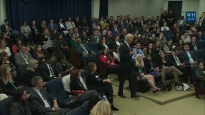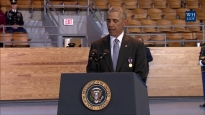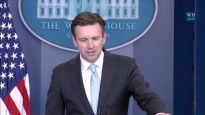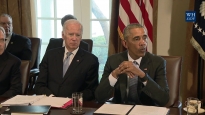Meeting Obligations to the Gulf Coast
June 16, 2010 | 7:15 | Public Domain
President Obama speaks after meeting with BP executives and announces that the company has agreed to set up a $20 billion escrow account administered by an independent party to pay claims for damages
from the oil spill.
Statement by the President After Meeting with BP Executives
2:25 P.M. EDT
THE PRESIDENT: Good afternoon, everybody. I just concluded a constructive meeting with BP’s chairman, Carl-Henric Svanberg, and I raised two issues at the meeting. First was the containment of the oil that is still spewing into the Gulf. As I mentioned last night, my administration has directed BP to mobilize additional equipment and technology, and in the coming days and weeks, these efforts should capture up to 90 percent of the oil that is leaking out of the well.
Now, that’s not good enough. So we will continue to press BP and draw on our best minds and resources to capture the rest of the oil until the company finishes drilling a relief well later in the summer that is expected to stop the leak completely.
The second topic revolved around the issue of claims. As I traveled across the Gulf I heard growing frustration over the pace at which claims had been paid. And I also heard concerns about whether BP will make resources available to cover legitimate claims resulting from this disaster. So this discussion today was essential.
Currently, under federal law, there is a $75 million cap on how much oil companies could under certain circumstances be required to pay for economic damages resulting from a spill such as this. That amount obviously would be insufficient. That’s why I'm pleased to announce that BP has agreed to set aside $20 billion to pay claims for damages resulting from this spill.
This $20 billion will provide substantial assurance that the claims people and businesses have will be honored. It’s also important to emphasize this is not a cap. The people of the Gulf have my commitment that BP will meet its obligations to them. BP has publicly pledged to make good on the claims that it owes to the people in the Gulf, and so the agreement we reached sets up a financial and legal framework to do it.
Another important element is that this $20 billion fund will not be controlled by either BP or by the government. It will be put in a escrow account, administered by an impartial, independent third party. So if you or your business has suffered an economic loss as a result of this spill, you’ll be eligible to file a claim for part of this $20 billion. This fund does not supersede either individuals’ rights or states’ rights to present claims in court. BP will also continue to be liable for the environmental disaster it has caused, and we’re going to continue to work to make sure that they address it.
Additionally, BP voluntarily agreed to establish a $100 million fund to compensate unemployed oil rig workers affected by the closure of the deepwater rigs.
We’ve mutually agreed that Ken Feinberg will run the independent claims process we’re putting in place. And there will be a three-person panel to adjudicate claims that are turned down. Every effort will be made to expedite these claims. Ken has long experience in such matters, including running the fund that compensated the victims of 9/11. And I’m confident he will ensure that claims are administered as quickly, as fairly, and as transparently as possible.
BP’s liabilities for this spill are significant -- and they acknowledge that fact. We will continue to hold BP and all other responsible parties accountable. And I’m absolutely confident BP will be able to meet its obligations to the Gulf Coast and to the American people. BP is a strong and viable company and it is in all of our interests that it remain so. So what this is about is accountability. At the end of the day, that’s what every American wants and expects.
The structure we’re establishing today is an important step towards making the people of the Gulf Coast whole again, but it’s not going to turn things around overnight. And I want all Americans to know that I will continue to fight each and every day until the oil is contained, until businesses recover, and until the Gulf Coast bounces back from this tragedy, as I know it will.
One last point. During a private conversation with Chairman Svanberg I emphasized to him that for the families that I met with down in the Gulf, for the small business owners, for the fishermen, for the shrimpers, this is not just a matter of dollars and cents; that a lot of these folks don’t have a cushion. They were coming off Rita and Katrina; coming off the worst economy that this country has seen since the Great Depression, and this season was going to be the season where they were going to be bouncing back. Not only that, but this happened, from their perspective, at the worst possible time, because they’re making their entire income for the year in the three or four months during which folks can take their boats out, people are coming down for tourism.
And so I emphasized to the chairman that when he’s talking to shareholders, when he is in meetings in his boardroom, to keep in mind those individuals; that they are desperate; that some of them, if they don’t get relief quickly, may lose businesses that have been in their families for two or three generations. And the chairman assured me that he would keep them in mind.
That’s going to be the standard by which I measure BP’s responsiveness. I think today was a good start, and it should provide some assurance to some of the small business owners and individuals down in the Gulf who I was visiting with that BP is going to meet its responsibilities. But I indicated to the chairman that, throughout this process, as we work to make sure that the Gulf is made whole once again, that the standard I’m going to be applying is whether or not those individuals I met with, their family members, those communities that are vulnerable, whether they are uppermost in the minds of all concerned. That’s who we’re doing this work for.
All right. Thank you very much, everybody.
END
2:33 P.M. EDT
** This transcript has been corrected.
|
January 6, 2017
|
January 6, 2017
|
January 5, 2017
|
January 5, 2017
|
|
January 4, 2017
|
January 4, 2017
|
January 4, 2017
|
January 4, 2017
|
- &lsaquo previous
- 1
- 2
- 3
- 4
- 5
- 6
- 7
- 8
- 9
- …
- next &rsaquo







